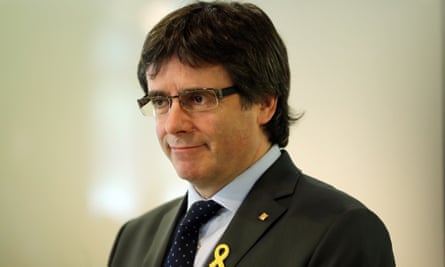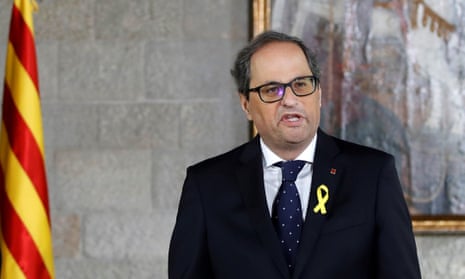Quim Torra has been sworn in as the 131st president of Catalonia amid growing pressure over the “xenophobic” and anti-Spanish tone of his past writings and comments.
Torra, a hardline Catalan nationalist handpicked by the region’s deposed president, Carles Puigdemont, was elected by 66 votes to 65 on Monday and assumed office at a low-key ceremony in Barcelona on Thursday.
“I promise to loyally fulfil the duties of the post of regional president being faithful to the will of the Catalan people represented by the Catalan parliament,” he said, using the same formula as Puigdemont and avoiding mention of obeying the Spanish constitution. Central government representatives did not attend the ceremony.
Since his appointment the 55-year-old lawyer and editor has been dogged by accusations that he is Puigdemont’s puppet and that his long history of anti-Spanish comments makes him unfit to lead a government.
Six years ago, Torra wrote an article in which he described those who opposed the use of the Catalan language and objected to expressions of Catalan culture and traditions as “carrion-feeders, vipers and hyenas” and “beasts in human form”.
“It is a sick phobia,” he wrote. “There is something Freudian in these beasts, a rough patch in their DNA.”
In a string of tweets written the same year, Torra suggested that “Spaniards know only how to plunder”, claimed that Catalonia had been under Spanish occupation since 1714 and said Spaniards had long since removed the word “shame” from the dictionary. He later apologised “if anyone was offended by the tweets”.
He has also been ridiculed for saying that Catalonia was suffering “a humanitarian crisis”.
Politicians including Spain’s prime minister, Mariano Rajoy, and Pedro Sánchez, the leader of the opposition Socialist party, have criticised the “xenophobic nature” of his past pronouncements.
On Tuesday, a Catalan anti-racism group took Torra to task for repeatedly using “a dangerous, irresponsible and unacceptable discourse, based on prejudices”.
The Spanish justice ministry declined to comment on reports that prosecutors were looking into the possibility of bringing charges of racial hate crimes against Torra over his tweets and articles.
Although Torra has said he wants to hold talks with Rajoy, he insists that Puigdemont remains the “legitimate president” of Catalonia and has vowed to try to restore his predecessor’s sacked cabinet to their previous posts and push on with plans to create an independence republic.
The region has been under direct control from Madrid since the end of October last year, when Rajoy responded to Puigdemont’s unilateral independence referendum and the subsequent declaration of independence by firing the Catalan president and his cabinet and calling new elections.
However, Rajoy’s electoral gamble failed to pay off: the pro-independence bloc retained its parliamentary majority and Puigdemont, who remains in self-imposed exile in Germany, finally anointed Torra as his successor after efforts to install three other candidates, including himself, failed.
Torra’s closeness to Puigdemont and similarly firm stance on independence have not gone unnoticed.
A cartoon in El Mundo this week showed the former president as a fairy godmother, telling a Pinocchio-Torra puppet: “And if you’re really good, I’ll turn you into a real boy.”
Pablo Simón, a political scientist at Carlos III University in Madrid, said Torra was likely to prove a divisive choice both inside Catalonia and within the independence movement itself, and that Puigdemont had chosen him as a means of maintaining the current situation of tension and polarisation.

“It suits Puigdemont better because at the end of the day, it reinforces the idea of a stopgap presidency, which will be subordinate to his presidency in Berlin,” said Simón. “It’s about the idea of trying to restore the last government rather than trying to move things forward, like being a statue made of salt, paralysed and always looking backwards.”
Antonio Barroso, an analyst at the political risk advisory firm Teneo Intelligence, said Puigdemont was using Torra as a means to remain relevant at home and abroad and was “prioritising his own strategy over the unity of the pro-independence movement”.
Barroso said that Torra’s anti-Spanish declarations would damage the independence movement’s international image, with the president’s old articles being seized on by opponents of secession.
“The whole rhetoric of the independence movement says: ‘This is about democracy.’ But now the other side can say it’s not about democracy because clearly you have someone with ideas that try to exclude one part of the population.”
Some see the advent of Torra as proof that a latent strain of supremacism is seeping into the Catalan mainstream.
“Catalan nationalism has always been characterised by what you could call a ‘civic nationalism’; it’s always been based on integrating people who come into Catalonia and on a non-ethnic idea of who Catalans are,” said Pau Marí-Klose, a professor of sociology at the University of Zaragoza.
But the polarisation and radicalisation brought about by Puigdemont’s push for independence – and the Spanish authorities’ response to it – had “slightly opened the door” to Torra’s school of thought and reignited old feelings of resentment.
“The idea that Catalonia has been mistreated by Spain has gathered more and more momentum during the process and has somehow given rise to these very supremacist ideas: that anything Spanish is despicable; that Spanish culture is prone to authoritarianism and isn’t a truly European culture, whereas Catalan culture is,” said Marí-Klose.
“There’s a metaphor that you see, even in cartoons, of Spain as an abusive husband and Catalonia as the wife trying to leave the relationship but isn’t allowed … Torra feeds off that but that doesn’t mean that the majority of Catalans buy into these ideas.”
